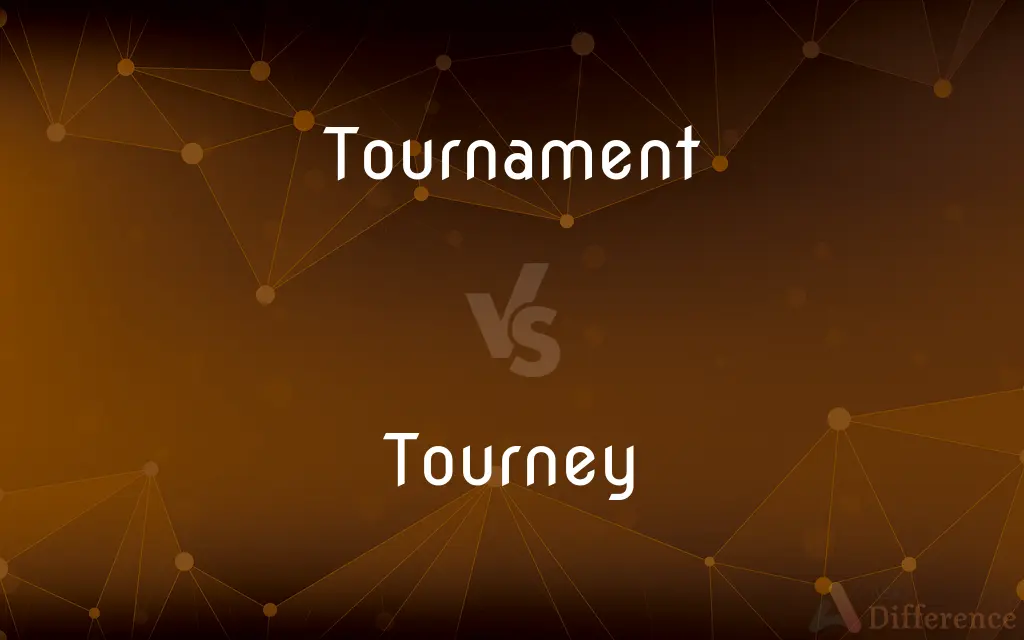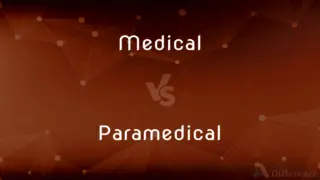Tournament vs. Tourney — What's the Difference?
By Urooj Arif & Fiza Rafique — Updated on March 25, 2024
Tournament refers to structured competition with multiple participant or teams, often in series of games leading to final winner. Tourney is simply shortened, informal for tournament, with no significant in meaning but often used in more casual contexts.

Difference Between Tournament and Tourney
Table of Contents
ADVERTISEMENT
Key Differences
A tournament is a competitive event where individuals or teams compete in a series of games or matches, following specific rules, to determine a champion. Tourney, on the other hand, is colloquially used as a shorthand for tournament.
Despite the difference in formality, the use of tourney instead of tournament does not change the nature of the event itself. Both terms describe an organized competition aimed at determining a winner or winners among a group of participants through a series of contests. The choice between using tournament or tourney often comes down to the tone and formality of the communication rather than the structure or scale of the event.
In practical applications, major sports leagues, educational institutions, and professional organizations are more likely to use the term tournament in official communications, documentation, and advertising to convey the formal and official status of the event. Conversely, tourney is more likely to be used in informal settings, such as casual conversations, social media, or informal event announcements, where the emphasis is on fun, engagement, and accessibility rather than formality.
Despite the casual nature of the term tourney, it can still refer to events that are serious and competitive. The context in which it is used often provides clues about the level of formality and seriousness of the competition. Whether an event is labeled as a tournament or a tourney, the fundamental aspects of competition, organization, and the pursuit of victory remain consistent.
Comparison Chart
Formality
Formal and structured competition.
Informal or casual term for a tournament.
ADVERTISEMENT
Usage
Used in official, organized contexts.
Used in casual or conversational contexts.
Nature
Involves a series of games or matches to determine a winner.
Same as tournament, but with a casual tone.
Common Contexts
Professional sports, academic competitions, official leagues.
Social media, casual discussions, informal competitions.
Implications
Conveys an official, organized event with specific rules.
Suggests a fun or less formal competition.
Compare with Definitions
Tournament
Recognized for its formal organization and scheduling.
The basketball tournament bracket was announced two weeks in advance.
Tourney
Can be found in social media posts or informal invites.
Save the date for our annual charity golf tourney!
Tournament
A structured series of competitive games leading to a final winner.
The national chess tournament attracted players from across the country.
Tourney
Used in casual conversations or non-professional settings.
Join our weekend gaming tourney and win cool prizes!
Tournament
Can be associated with professional leagues, schools, or clubs.
The golf tournament is a highlight of the club's annual events.
Tourney
Still involves competition and structure but with a lighter tone.
The local community center hosts a chess tourney every month.
Tournament
Often involves multiple rounds and a variety of participants or teams.
The annual tennis tournament features both singles and doubles matches.
Tourney
Reflects the essence of a tournament without the formal trappings.
Our office ping-pong tourney is the most awaited event of the year.
Tournament
Aims to determine a champion through a clear set of rules.
The tournament's rules were designed to ensure fair play and competition.
Tourney
Informal term for a tournament, emphasizing a fun or casual event.
We're organizing a soccer tourney for the neighborhood kids this weekend.
Tournament
A tournament is a competition involving at least three competitors, all participating in a sport or game. More specifically, the term may be used in either of two overlapping senses: One or more competitions held at a single venue and concentrated into a relatively short time interval.
Tourney
A tournament, especially a medieval joust.
Tournament
(in a sport or game) a series of contests between a number of competitors, competing for an overall prize.
Tourney
Take part in a medieval joust
French knights also tourneyed in England
Tournament
(in the Middle Ages) a sporting event in which two knights (or two groups of knights) jousted on horseback with blunted weapons, each trying to knock the other off, the winner receiving a prize.
Tourney
To compete in a tournament.
Tournament
A series of contests in which a number of contestants compete and the one that prevails through the final round or that finishes with the best record is declared the winner.
Tourney
A tournament.
Tournament
A medieval martial sport in which two groups of mounted and armored combatants fought against each other with blunted lances or swords.
Tourney
Tournament.
Tournament
(historical) During the Middle Ages, a series of battles and other contests designed to prepare knights for war.
Tourney
(archaic) To take part in a tournament.
Tournament
A series of games; either the same game played many times, or a succession of games related by a single theme; played competitively to determine a single winning team or individual.
Tourney
A tournament.
At tilt or tourney or like warlike game.
We hold a tourney here to-morrow morn,And there is scantly time for half the work.
Tournament
(graph theory) A digraph obtained by assigning a direction to each edge in an undirected complete graph.
Tourney
To perform in tournaments; to tilt.
Well could he tourney, and in lists debate.
Tournament
A mock fight, or warlike game, formerly in great favor, in which a number of combatants were engaged, as an exhibition of their address and bravery; hence, figuratively, a real battle.
With cruel tournament the squadrons join.
Tourney
A sporting competition in which contestants play a series of games to decide the winner
Tournament
Any contest of skill in which there are many contestents for championship; as, a chess tournament.
Tourney
Engage in a tourney
Tournament
A sporting competition in which contestants play a series of games to decide the winner
Tournament
A series of jousts between knights contesting for a prize
Common Curiosities
Do all sports and games use the term "tourney"?
While "tourney" can be applied to any type of competitive event, its usage depends on the formality of the setting and the preference of the organizers.
Is the term "tourney" acceptable in official documents?
Typically, "tournament" is preferred in official documents due to its formality, while "tourney" is more suited to informal communications.
Can a tourney be as competitive as a tournament?
Yes, a tourney can be just as competitive as a tournament; the term does not imply a lesser degree of competition, only a more casual context.
What is a tournament?
A tournament is a structured competitive event involving a series of games or matches to determine a champion.
How does a tourney differ from a tournament?
A tourney is simply an informal term for a tournament, often used in casual or conversational contexts without altering the fundamental nature of the event.
What makes a tournament official?
Official status typically involves formal organization, adherence to a specific set of rules, and recognition by governing bodies or institutions.
Can a small, local event be called a tournament?
Yes, even small, local events can be called tournaments if they involve a structured competition aiming to determine a champion.
Can tournaments have multiple games or sports?
Yes, some tournaments involve multiple games or sports, especially in multi-disciplinary events or leagues.
How do online competitions fit into these definitions?
Online competitions can be described as tournaments or tourneys, depending on their organization and the formality of their presentation.
Is there a difference in audience between a tournament and a tourney?
The audience may vary more by the nature of the event than the term used, though tourneys may imply a more casual or community-focused audience.
How important is the structure in a tournament or tourney?
The structure is crucial in both, as it defines the progression of the competition, the scheduling of matches, and the determination of a winner.
Are tournaments always related to sports?
While sports are a common context, tournaments can involve any competitive activity, including academic contests, gaming, and other skills.
How are winners recognized in a tournament or tourney?
Winners are typically recognized through awards, prizes, and public acknowledgment, regardless of the formality of the event.
How do participants qualify for a tournament or tourney?
Qualification criteria can vary widely, including rankings, previous performance, invitations, or open registration, depending on the event's nature.
Share Your Discovery

Previous Comparison
Medical vs. Paramedical
Next Comparison
Sensor vs. DetectorAuthor Spotlight
Written by
Urooj ArifUrooj is a skilled content writer at Ask Difference, known for her exceptional ability to simplify complex topics into engaging and informative content. With a passion for research and a flair for clear, concise writing, she consistently delivers articles that resonate with our diverse audience.
Co-written by
Fiza RafiqueFiza Rafique is a skilled content writer at AskDifference.com, where she meticulously refines and enhances written pieces. Drawing from her vast editorial expertise, Fiza ensures clarity, accuracy, and precision in every article. Passionate about language, she continually seeks to elevate the quality of content for readers worldwide.
















































